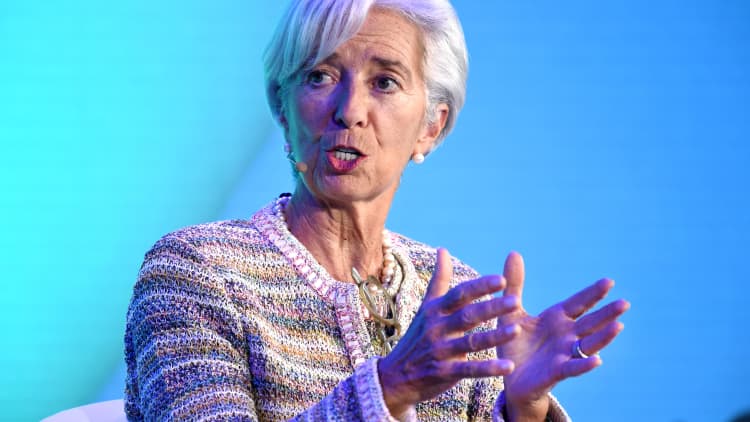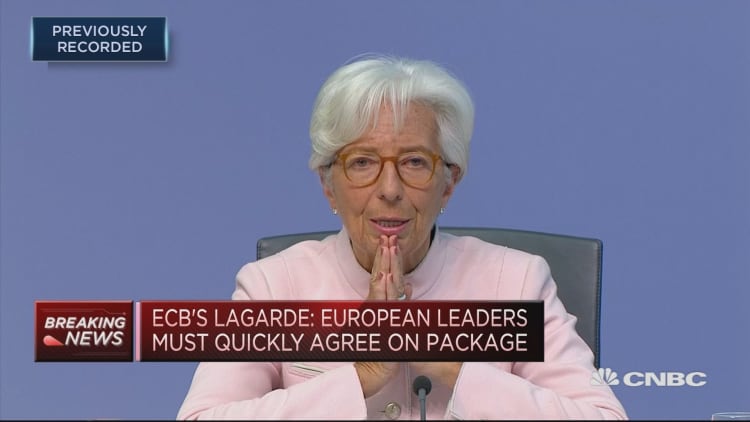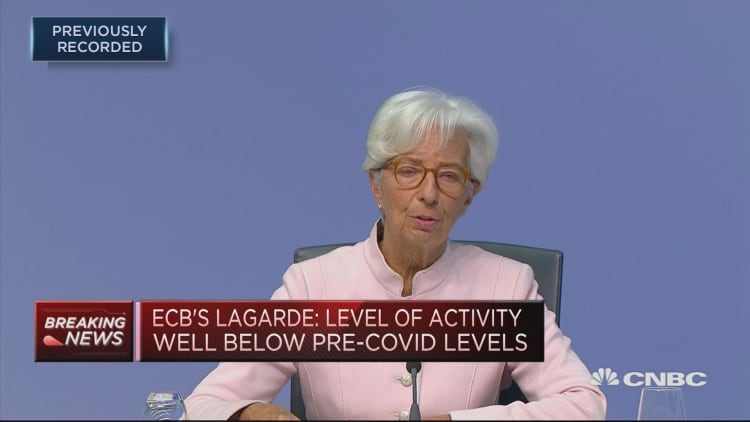
The European Central Bank opted Thursday to keep its interest rates and emergency coronavirus stimulus program unchanged, while it monitors the economic strength of the euro zone.
It said it would continue with its massive stimulus program announced in March to mitigate the economic shock from the pandemic. Last month, it expanded its Pandemic Emergency Purchase Program by 600 billion euros, bringing the size of the stimulus program to 1.35 trillion euros ($1.54 trillion) to be deployed until June 2021, or until the bank believes the crisis is over.
In a statement accompanying the decision Thursday, the central bank said asset purchases under PEPP would continue to be conducted in a "flexible manner" over time, across asset classes and jurisdictions. The interest rate on its main refinancing operations stands at 0%, and the interest rates on its marginal lending facility and deposit facility remain at 0.25% and -0.50% respectively.
The ECB expects rates to remain at their "present or lower" levels until it has seen the inflation outlook "robustly converge to a level sufficiently close to, but below, 2% within its projection horizon, and such convergence has been consistently reflected in underlying inflation dynamics."
The euro was little changed against the dollar following the decision, hovering at around $1.14.

The latest economic projections from the ECB have pointed to an 8.7% contraction in GDP (gross domestic product) for the euro zone this year. However, the IMF has warned that the region could shrink as much as 10.2% in 2020.
Speaking at a press conference Thursday, ECB President Christine Lagarde said that while activity has begun to pick up, the recovery is in its early stages and remains uneven across sectors and jurisdictions, leaving the outlook "highly uncertain" with risks tilted to the downside.
Asked by CNBC's Annette Weisbach about whether the full 1.35 trillion euro PEPP envelope is likely to be required, Lagarde highlighted that the central bank had purchased over 360 billion euros worth of bonds up until the end of June and had now begun slowing down, due to financial markets stabilizing and reduced "fragmentation risk."
"Unless — and we don't see it for the moment frankly — but unless there were significant upside surprises, our baseline remains that we will use the entire envelope of PEPP," Lagarde said.
"Clearly the second function of PEPP that I have mentioned, which is the monetary stance in order to respond to the shock of coronavirus, is still around and we still need to address that, so we will continue to use the envelope of PEPP and make sure that it helps us get back to the trajectory of inflation pace pre-Covid-19."
Fiscal support 'critical'
Lagarde also urged European leaders to agree on a fiscal package, emphasizing that an "ambitious and coordinated fiscal stance remains critical" and must include "three safety nets for workers, businesses and sovereigns."
EU leaders meet at the European Council Summit this weekend to negotiate the proposed 750 billion euro EU Recovery Fund.

"As the ECB switches to the 'wait-and-see' mode for the rest of the summer, the focus shifts towards the Recovery Fund and the long-term budget," said Anna Stupnytska, global macro economist at Fidelity International.
"This week's Summit might not bring a final agreement just yet, but any progress on the most contentious issues, including governance and conditionality, would send a strong signal on the prospects for the breakthrough in the near future."
Recent economic data has shown a rebound in economic activity, which has coincided with many European countries lifting some of their lockdown measures. However, two ECB members have cautioned about the pace of economic recovery.
ECB Chief Economist Philip Lane warned in a speech last month that, "weak demand, continued supply constraints and ongoing social distancing restrictions are hampering the normalization of economic activity."
Meanwhile, Klaas Knot, the Dutch central bank governor, said as part of an online forum in June that, "economic activity will only approach the pre-Corona 2019 level by the end of our projection horizon, at the end of 2022."


